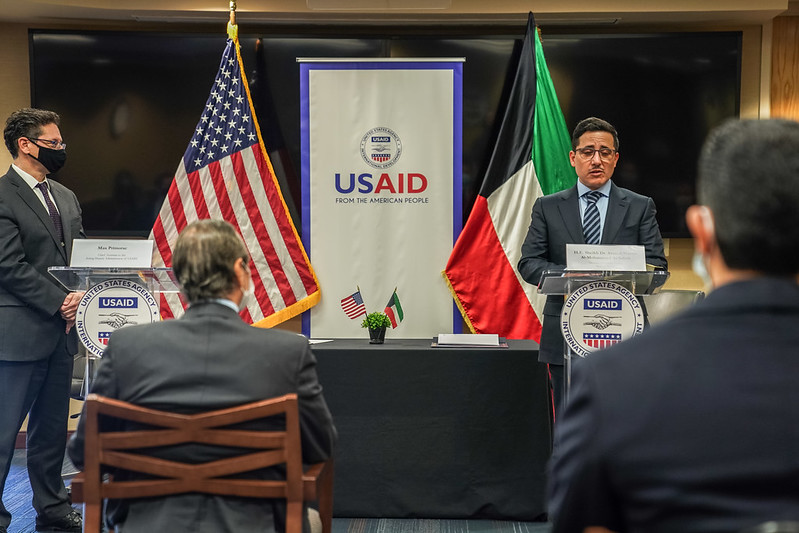USAID Pledges $176 Million to Combat Poverty in West Africa
 The West Africa region is grappling with significant challenges, including food insecurity and economic instability. These challenges severely affect the quality of life, especially among vulnerable communities. As of April 2024, Mali, a nation steeped in conflict, faces acute food shortages. An estimated 2,600 people are at risk of severe starvation daily.
The West Africa region is grappling with significant challenges, including food insecurity and economic instability. These challenges severely affect the quality of life, especially among vulnerable communities. As of April 2024, Mali, a nation steeped in conflict, faces acute food shortages. An estimated 2,600 people are at risk of severe starvation daily.
In Northern Nigeria, about 31% of women aged 15 to 49 suffer from acute malnutrition. Additionally, predictions indicate that around 55 million people in West and Central Africa could experience food insecurity during the lean season from June to August 2024. Furthermore, in West Africa, eight out of 10 children between 6 to 23 months old do not receive the minimum required food intake for healthy growth and development. In response, countries worldwide are pledging aid and support to those struggling with poverty in West Africa.
The U.S. Provides Aid to West Africa
On May 28, 2024, the United States Agency for International Development (USAID) announced it would provide an additional $176 million in humanitarian aid to West Africa. This funding aims to address the region’s severe security challenges and assist vulnerable communities. This contribution follows a previous allocation of $150 million on March 16, 2023. Funds were allocated to countries in West and Central Africa and the Sahel region. The funding supported refugees and internally displaced persons with health care and nutritional services through the State Department’s Bureau of Population, Refugees and Migration (PRM). USAID’s efforts in West Africa are coordinated with United Nations (U.N.) agencies, including the World Food Programme (WFP) and the United Nations Office for the Coordination of Humanitarian Affairs (OCHA), to facilitate USAID’s humanitarian assistance.
Details of USAID’s $176 Million Aid
USAID’s $176 million in foreign aid to West Africa encompasses food and nutritional support as well as health care services. In 2022, for example, USAID’s regional office in the Sahel provided emergency food assistance to about 1.8 million vulnerable individuals in Chad. Furthermore, they constructed 70 shelters for those displaced by local conflicts. Additionally, in Burkina Faso, this office facilitated pregnancy, natal and neonatal health care for roughly 405,000 mothers and their newborns. This support is crucial. More than 370 health care facilities in Burkina Faso were at risk of closure by February 2024 due to ongoing conflict between the government and armed rebels. This situation has left approximately 3.5 million people in urgent need of health care services. These ongoing efforts underscore the significance of the United States’ (U.S.) recent relief efforts in West Africa, where many countries face crises similar to those in Burkina Faso.
How U.N. Agencies Utilize Aid Funds
USAID’s $176 million foreign aid package to West Africa includes funding for U.N. agencies to help address critical issues like food insecurity and health care access in the region. For instance, between July 2022 and January 2023, the World Health Organization (WHO) in Mali supported approximately 75,000 people in the Menaka region. The organization provided medical and nutritional assistance, including treating 1,034 malnourished children. Additionally, these funds enable the World Food Programme (WFP) to continue airlifting food to countries such as Burkina Faso. More than 1.2 million displaced individuals have benefited from these ongoing efforts. This underscores the vital role U.N. agencies play in ensuring that international aid is effectively utilized to support vulnerable populations.
Looking Ahead
West Africa faces ongoing challenges of food insecurity and economic instability, affecting millions of vulnerable people. USAID’s $176 million aid aims to reduce poverty in West Africa by providing essential food and health care support. Collaborating with U.N. agencies, this initiative strives to alleviate the severe conditions in the region, underscoring the necessity for continuous international assistance.
– Abdullah Dowaihy
Abdullah is based in Riyadh, Saudi Arabia and focuses on Good News and Global Health for The Borgen Project.
Photo: Flickr
